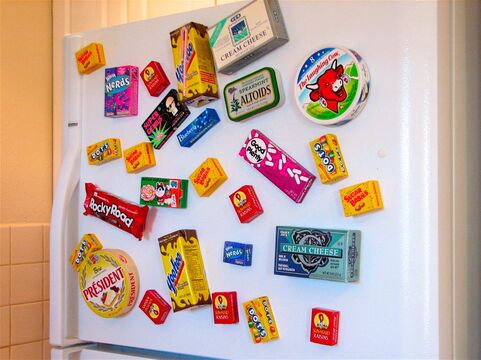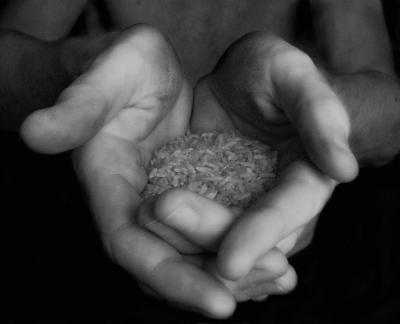all of the selves we Have ever been
 I pick up a new book, Buy Nothing, Get Everything. On page 21, I come to a shocking statistic: The average American home is filled with more than 300,000 items. Confident that I am below average in yet another category, I read on: according to a study of possessions in homes, there is a correlation between the number of magnets on refrigerators and the amount of stuff in the household. Those words tear through my storage unit of denial like a Florida hurricane. From my seat at the dining room table, I eye both the overflowing bookshelves in the living room and the layer of magnets covering my refrigerator door. I immediately go to the kitchen and gaze into my personal magnetosphere. In this new state of enlightenment, I realize those small advertisements and souvenirs hold more power than meets the eye. If they can suck that much stuff into your house, surely, they can stop a pacemaker cold or wipe the memory from a desktop computer. I fear for my visitors with metal joint replacements. After wrapping some yellow caution tape around my front door, I don a hazmat suit and get to work. I commit to clearing magnets from my refrigerator door. Step one? Self-examination. Why do I have so many magnets in the first place? Some are so cute and well-crafted that they look like real strawberries, bananas, and cookies. Works of art they are. And speaking of art, some of the magnets are actual handcrafted artwork—projects made by my children as Mother’s Day gifts 25 years ago when the children were small. It is hard to part with sentiment. There also a few magnets spouting funny and inspirational sayings such as the one black and white photo of a woman in a 1950s’ era bathing suit: “I’m one stomach flu away from my goal weight.” It was a gift from a friend during one of my many weight loss attempts. Humor, sentiment, gift, and reminder. It is practically a medical device for overall well-being. But the majority of the magnets are business advertisements. I have 12 copies of the same magnet from a bread company reminding me how to warm up a loaf of their bread. Most of the other magnets came to me as promotions from now defunct businesses. I get to work removing magnets…except for the really cute ones…and the sentimental ones. I put the remaining extra magnets into a plastic bag. I walk them to the storage closet to add to my box of miscellaneous items where I find more sandwich bags filled with refrigerator magnets from previous but forgotten episodes of clean-off the refrigerator. Apparently, refrigerator magnets can also wipe the human memory clean. Why can’t I just walk my bags full of magnets to the dumpster? I face a dilemma. With my new understanding of the power of refrigerator magnets, do I dare just toss them in the trash? What happens when all of those magnets get buried in the landfill? Will they suck passing automobiles into the rubble? Turn the world upside down? Pull Asia up by the roots? Airplanes out of the sky? I go to the tree of knowledge to do some research. I Google “refrigerator magnets” and learn that collecting magnets can be a bona fide hobby. There is no recognized term for someone who collects refrigerator magnets, but there is a woman collector identified in the Guinness Book of World Records. Her name is Louise Greenfarb, and she lives in Henderson, Nevada. Back in 2015, Louise had 45,000 unduplicated magnets. Dear Lord, how many household items does she have? I dig further to see if there is a known ratio of magnets to stuff. I do not find the formula, but I do find a magazine for refrigerator magnet collectors called Collector’s Lot Magazine. Perhaps you have to be a paid-subscriber to access that that kind of critical information. As I tend to do when I am in a quandary, I get back to my book, and I discover a new term: nillionaire. A nillionaire is person who has bought nothing for months or years. The book does not say what nillionaires do with their old refrigerator magnets, but they must have some strategy for breaking the force field. Until I unravel this mystery of how to dispose of my refrigerator magnets, I wrap them in plastic, place them in a box, and bury them deep within my storage closet. I vow to become a nillionaire. Now, with this major reduction in magnetic force, maybe I can let go of all of those twisty-ties.
0 Comments
 During my recent musings about Nancy Drew, I contacted several members of my unofficial Nancy Drew fan club and asked them to share their memories about our beloved teenage detective. Each woman eagerly shared still vivid memories about Nancy Drew and the entire series of books. We felt like kids again swapping tales and recreating the excitement of all that youthful sleuthing. While reading remains my favorite past time and greatest pleasure, no fictional character has ever filled the gap left when I outgrew the Nancy Drew mystery series. Pondering this I asked a fellow fan, “Who might be a new Nancy Drew for this stage of life?” My friend considered the question for several minutes and came back with, “Jessica Fletcher?” Jessica Fletcher? More pondering. Could Jessica Fletcher be a new sleuthing idol for my geriatric years? I had been a Jessica Fletcher fan and regular viewer of Murder, She Wrote. Every Sunday night for 12 years beginning in 1984, I and 30 to 40 million other people tuned in to CBS to see what Jessica Fletcher was up to that week. I did love that Jessica Fletcher was a smart, fearless, bike-riding, world-traveling, single gal. It didn’t hurt that she was a successful mystery writer and crack amateur sleuth. Just as I envied Nancy Drew and her small town, speedy blue roadster, good friends, and apparent lack of homework and curfews, I envied Jessica Fletcher’s lifestyle: retired, free of obligations, surrounded by the beauty of coastal Maine, living in a big house in the small town of Cabot Cove, a town where everybody knew her name and the sheriff stopped by for coffee, a place where a woman could safely get around town on a bicycle. Jessica sure seemed to have it all, but a substitute for Nancy Drew? It just wasn’t working for me. I guess the kid in me expects an old high school English teacher to have all of the answers. Nothing to marvel at there. The grown-up in me is not surprised when a mature, educated woman is self-assured and wise, capable of freely traveling the world as a best-selling mystery writer. And the final obstacle? Jessica Fletcher’s life was not about mystery; it was about murder. No matter where Jessica went, someone died. While I enjoy a good adventure, I am not fearless. I tend to shy away from homicides. I don’t want to risk getting into the line of fire or spending my golden years in the slammer. Who can take Nancy Drew’s place? My guess is that no one can. Some things and some people are irreplaceable. Another mystery solved. But Nancy Drew’s influence continues. She provided me with many happy memories. Memories are the currency of the geriatric years. The puzzle has become how to hang onto them. Often, we fail to value remembering until we begin to forget. I hope I never forget Nancy Drew or the names of my children or where I live. Until someone solves the really big mystery of Alzheimer’s Disease, I guess Jessica Fletcher does make a pretty good role model for growing older with grace and vigor.  After a year of living like Big Foot, I am preparing for re-entry into the post-pandemic world by once again showering daily, applying make-up, and wearing clothes with waistbands. This morning I decided to go all out and put on a pair of earrings. When I opened my jewelry box the first thing to catch my eye was a black card containing a pair of “fashion earrings,” at least that’s what the card said. The earrings are shaped like sand dollars each nearly as large as the real thing. I have had these earrings for about 20 years, and they still sparkle like gold. These “jewels” remain on the card, unworn, because they are clip-ons and because they were a gift from my sweet children when they were small. The children purchased the earrings from the souvenir shop at the Virginia Marine Science Museum during a vacation with their father. I treasure the earrings and the memory. They will go with me if I am ever on the run. When my son, Sam, was a preschooler, he would browse the aisles of a store looking at all of the items that interested him. If he spotted something he wanted to purchase, Sam would call out, “Mom, do I have enough cents?” The spoken version of those words usually drew chuckles from the adults in the store. Little children know nothing of the origins of money or the value each coin or bill represents and yet they are masters of the art of giving. Children are eager to give long before they become wage earners and spenders, long before gift-giving becomes an obligation on their calendars, long before they come to expect anything in return. They give because it is natural and pure joy to do so. On February 20, 2020, Virginia Douglas published an essay, The Voice Said God Bless You, on the online magazine, The Braided Way. Douglas described her many interactions with the homeless, particularly, a man in her community named Danny. Douglas pondered why it is the homeless who always say, “God bless you,” in return for an act of kindness when others of greater means might not say thank or even acknowledge a special courtesy. Douglas’s question stayed with me all year like the newsfeed silently scrolling beneath the chatter of the evening news, drawing my attention away from the noise of the day and into a sacred space inside me. This morning, opening my jewelry box brought the question back as the top story. In her essay, Douglas offered up her own thoughts in answer to the question of why the homeless are the ones to say, “God bless you.” She speculated that when goodness comes out of nowhere, there must be a God to be thanked, or perhaps, the first encounter with Danny coming at Christmas, Danny “might be Jesus.” Once Douglas established a pattern of giving to Danny, the thought of seeing him again caused Douglas some anxiety. Had she established an expectation in Danny by giving him money? A friend advised Douglas to keep a bag of goodies in her car “so that you have something to give.” Having something to give relieved Douglas of her worry, and she continued to give to Danny whenever she saw him. The story got me thinking about the many ways we “give.” Giving can be pure instinct and joy. It can become the basis of connection and relationship. But giving can also establish expectations that then become hard to meet. Sometimes giving becomes nothing more than an obligation even leading to hurt or resentment. Sometimes people give not to honor the beneficiary, but to show off. It matters not just what we give, but also why. Whenever I see a homeless person holding a sign at the highway entrance or sleeping on a park bench, I feel a sense of shame and self-consciousness about having come unprepared with nothing to give. Having nothing to share violates that instinct to give that is present in us as children. I instantly re-evaluate my life and am filled with an awareness of all that I have however humble it seems in comparison to others. God has blessed me. Thinking about how hurtful it is to be ignored, rendered invisible, I give the gift of acknowledgement. I do not look away. Historically, people who are struggling financially receive many negative messages about what kind of people they are. Somehow their needs must be their own fault. More recently, the pandemic has made it clear that disaster can strike anyone at any time. It takes courage to ask. And when we give generously, we get something back, something intangible. We express generosity as givers but gratitude is also a gift and a grace offered by the receivers of our generosity. Why are the homeless the ones to say, “God bless you?” Maybe because it feels good to give back, even if only a prayer. Giving something back equalizes the relationship. It adds some beauty to the world. When people connect out of kindness, perhaps God does bless that union. Maybe the homeless men and women are priests. And maybe God blesses the person who sees his neighbors. In the story of Jesus, he was on a mission. His people were the poor and brokenhearted. Maybe Danny was Jesus; if not, he was certainly one of the beloved. In this high tech, tumultuous world, we are encouraged to say hateful things about our neighbors, to behave outrageously. Without vigilance we will be robbed, not of our money, but of our instinct to be kind, to give generously, and to experience the joy and the grace that come naturally with giving. It costs nothing to see a person, to acknowledge their presence with our eyes, our ears, our words, our attention. Throughout history, so much conquest, so many of the world’s troubles were brought upon mankind in the name of someone’s God. If we are to use God’s name, let it be in the service of triumphing over poverty, greed, and unkindness toward our neighbors. We need each other. There is magic in giving. May God bless you. |
AuthorLilli-ann Buffin Archives
July 2024
Categories
All
|
 RSS Feed
RSS Feed